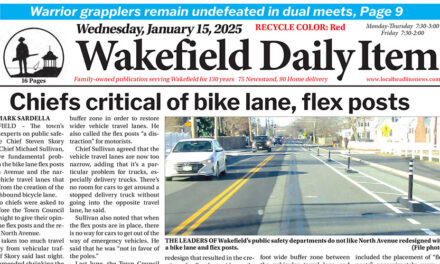By DAN TOMASELLO
LYNNFIELD — The town will be using existing funding sources to make repairs to the Lynnfield Public Library and the roadway network forward moving, Select Board Chair Dick Dalton said during Monday’s meeting.
Voters rejected Question 1, which pertained to the $18.3 million Lynnfield Public Library renovation project, 835 votes against to 540 in favor during the Special Town Election on Jan. 6. Townspeople also rejected Question 2, which involved the DPW’s 10-year street improvement program that would have totaled $12,850,000, by 792 votes against to 580 in favor.
“The voters of the town have spoken clearly and loudly that they do not have the appetite at this time for major spending,” said Dalton. “This illustrates once again why town government is the truest form of democracy. The voters ultimately decide the outcome of public policy issues.”
Dalton said the town is currently in the process of developing a five-year capital improvement plan (CIP). He established a goal of developing a five-year CIP last spring.
“What this plan does simply put is it identifies and prioritizes the capital needs of the town over the next five years,” said Dalton. “This is similar to what we did six years ago when we developed the town’s strategic plan. It’s a necessary and valuable tool in managing the finances of the town. Standard and Poor’s recognizes the CIP’s value in evaluating the financial management of the town.”
Dalton said Department of Public Works (DPW) Director John Scenna will be giving an update on the CIP project at the Select Board’s next meeting.
“With the failure of the library and the streets improvement programs to obtain voter approval, I would expect the draft to include a forecast of capital expenditures necessary to keep the library in compliance with building codes and other work deemed to be absolutely necessary,” said Dalton. “In other words, renovations, expansions and improvements to the library would pretty much be off the table.”
Dalton also outlined how road construction would be funded in the wake of voters rejecting the DPW’s streets improvement program.
“Street improvements will continue to be funded by Chapter 90 funding as well as an annual allocation of town funds based on the availability of such funds and competing needs,” said Dalton.
Select Board Vice Chair Phil Crawford, who serves on the CIP Working Group, said the panel has “identified all of the department heads’ priorities and major capital expenditures both near-term and long-term.”
“That will be a good guide for us to use in the future,” said Crawford.
Select Board member Alexis Leahy said she is looking forward to learning more about the CIP and “how we are going to achieve the goals that are set forward in it.”
“I am looking forward to that discussion as well,” said Leahy.
Dalton said he, Town Administrator Rob Dolan and other local officials met with Standard and Poor’s to discuss the town’s bond rating last week. The town’s bond rating is currently AA+.
“We reviewed every aspect of the town’s finances, and I can report it was a very good meeting,” said Dalton. “Obviously, having an excellent bond rating is important in tha t it determines the cost for borrowing for the town. I fully expect that the town will maintain its AA+ rating. Rob Dolan put forward a good argument for us to be considered AAA, which is a rating very few municipalities are awarded.”
Dolan said the meeting with Standard and Poor’s went “excellent.”
Dalton also noted that the Supreme Judicial Court upheld the MBTA Communities law on Jan. 8. He said the ruling was “not unexpected.”
“What most lawyers were telling us was that the regulations were not promulgated as dictated in the Massachusetts General Laws,” said Dalton. “They will have to go back to the drawing board just for the regulations. Those regulations will most likely remain unchanged and will get promulgated correctly in the near term.”
Leahy recalled that Fall Town Meeting overwhelmingly approved a multifamily overlay zoning district that complies with the MBTA Communities law last November.
“We are all set because we have done what we needed to do,” said Leahy.





